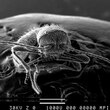Golden spider beetle
| Golden spider beetle | |
|---|---|

| |
| Scientific classification | |
| Domain: | Eukaryota |
| Kingdom: | Animalia |
| Phylum: | Arthropoda |
| Class: | Insecta |
| Order: | Coleoptera |
| Family: | Ptinidae |
| Genus: | Niptus |
| Species: | N. hololeucus
|
| Binomial name | |
| Niptus hololeucus (Faldermann, 1836)
| |
The golden spider beetle, Niptus hololeucus, is a species of spider beetle in the family Ptinidae.[1][2]
Description[edit]
Niptus hololeucus is 3–4.5mm in length.[3] Its body is covered in silky golden hairs and fine scales.
Habitat[edit]
Niptus hololeucus may be a pest of a wide variety of cereal based food products.[3] In 1981 an account of an infestation of these beetles was located in a roof void above offices in Rotherham, U.K.[4] This was found to be due to wild pigeons which were nesting within the loft: the beetles and their larvae were feeding upon their waste matter.
Distribution[edit]
It is a temperate species originating in West Asia but now cosmopolitan. It is widespread across western Europe.[5] A single record was first recorded in Iran in a cave 2014.[6] N. hololeucus is one of the two species of Niptus to be found in caves.[6]
Gallery[edit]
References[edit]
- ^ "Niptus hololeucus (Faldermann, 1835) [Golden Spider Beetle]". NBN. 2012–2013. Retrieved 2017-01-25.
- ^ Bouchard, Patrice; Bousquet, Yves; Davies, Anthony E.; Alonso-Zarazaga, Miguel A.; et al. (2011). "Family-group names in Coleoptera (Insecta)". ZooKeys (88). Pensoft Publishers: 1–972. doi:10.3897/zookeys.88.807. ISSN 1313-2989. PMC 3088472. PMID 21594053.
- ^ a b "Golden spider beetle, Niptus hololeucus". PestWeb. Retrieved 2017-01-25.
- ^ Stephen D Smith; “Boozers, Ballcocks and Bail” (Wombwell, 1996), pp.14-15
- ^ "Niptus hololeucus (Falderman, 1836)". 2016-07-25. Retrieved 2017-01-25.
- ^ a b Dashan, M.; Sadeghi, S; Bakhshi, Y.; Malek-Hosseini, M.J (2014). "First record and redescription of Niptus hololeucus (Faldermann, 1835) from Kangohar Cave (Coleoptera: Ptinidae)". Iranian Journal of Animal Biosystematics. 10 (2): 81–85.





